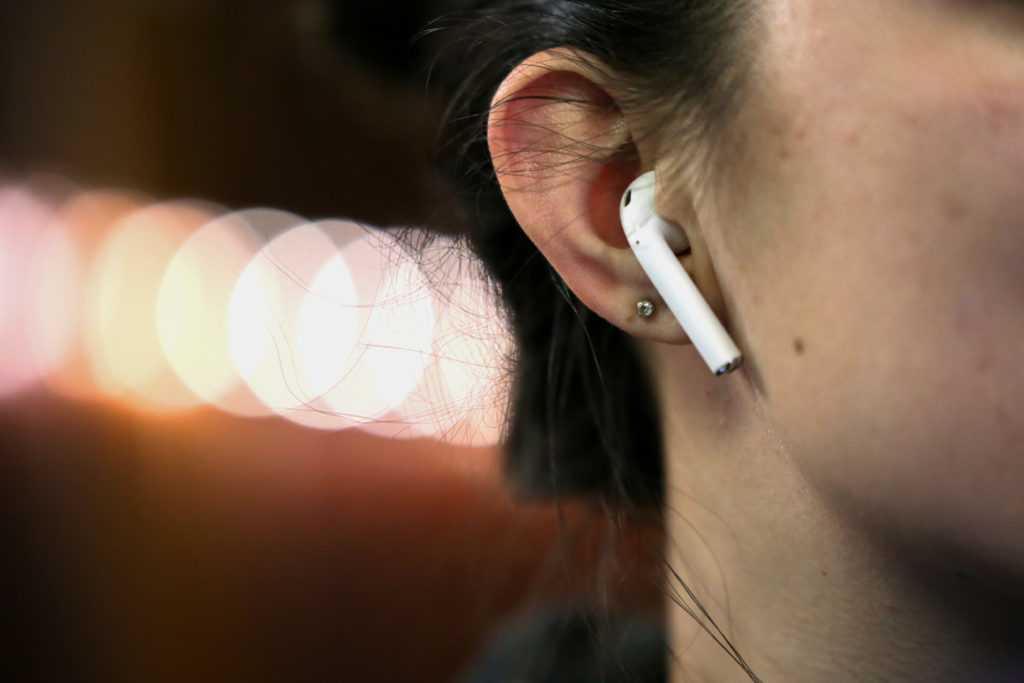Before Daina Eglitis, an associate professor of sociology and international affairs, begins teaching class, she makes sure to greet each student as they walk in the door.
But lately, she has been surprised by the number of students who do not reply because they are occupied by small white speakers tucked in their ears.
“They’re not ignoring me, they just don’t hear me with the AirPods,” Eglitis said. “It creates a little bit of an awkward situation when I’m speaking to them and they don’t even look at me.”
More than 20 students said in interviews that they use AirPods while walking around campus, studying in Gelman Library and even while their professors are teaching – and the device has a ubiquitous presence on campus.
More than half of students interviewed also said AirPods – which are wireless, fit discreetly into ears and can easily be covered with hair or a hat – have limited their social interaction.
Eglitis said using devices like AirPods as an escape can be beneficial in some cases, but a world where everyone is tuned out is dangerous.
“If they give someone enjoyment or the opportunity to tune out for a bit, those are benefits on an individual level,” she said. “But on a social level, the benefits are much more tenuous because it is a hindrance on social interaction.”
Laragh Cronin, a freshman majoring in political communication, said it is “really rude” when students use AirPods in class, but she often notices people discretely listening to something in their headphones during class instead of paying attention.
Cronin said over time, she has given into the trend and started using the device more often. Her near-constant use of AirPods has made her miss out on everyday conversations she would typically have when walking to class or waiting in line for meals, she said.
“AirPods have made me more anti-social, like I only take them out if I’m talking to a good friend,” Cronin said. “Sometimes I even have them in when I’m not listening to something so I don’t have to talk to people.”
Apple sold more than 15 million pairs of AirPods in 2017 and the company is projected to reach more than 55 million sales by the end of 2019, according to Fortune.
Sam Brooks, a freshman majoring in criminal justice, said she was thrilled with the high-quality sound and practicality of the AirPods she received as a high school graduation gift several months ago. But now she uses them for more than just a portable speaker – she employs them as a method to avoid uncomfortable situations.
“When you put in your pods, you’re transported to your own world where you don’t know what’s going on outside of your personal bubble,” Brooks said. “I think that you lose spontaneous interactions and therefore, I’m making fewer memories probably.”
At nearly $160 per pair, AirPods are one of Apple’s least expensive items but still come with a hefty price tag for a pair of headphones. Some students said in addition to serving as a shield against unwanted social interaction, the product is often deemed a status symbol alongside items like designer bags and Canada Goose jackets.
Maya Konings, a freshman majoring in business administration, said because Apple regularly releases new products, buyers are convinced that they need the latest item “to be cool.”
“There is always going to be something that exists to be a signifier of wealth,” Konings said. “I definitely have seen my peers feel the pressure to buy AirPods because they look cool.”
Salah Hassan, a professor of marketing and brand management, said Apple’s approach to releasing new products is strategic.
When the company released the iPhone 7, which lacked a headphone jack, it made the wireless headphones a necessary accessory for the latest phone, he said. Since the product has grown in popularity, AirPods are now disassociated from their original purpose and expanded to a much broader audience.
“Wireless devices are in high demand with today’s highly mobile millennial consumers who are really inspiring a hands-free type of communication,” Hassan said.
But Hassan said the product’s widespread presence is just an extension of technology’s broad influence on society, but ultimately consumers have the final word in how they will use the latest technology.
“I think moderation is everything and users need to be educated in moderation and appropriateness,” Hassan said. “Technology is adaptable, it’s how we use it that matters. If we use it in moderation, then it is appropriate.”
Aldonza Chaves contributed reporting.





